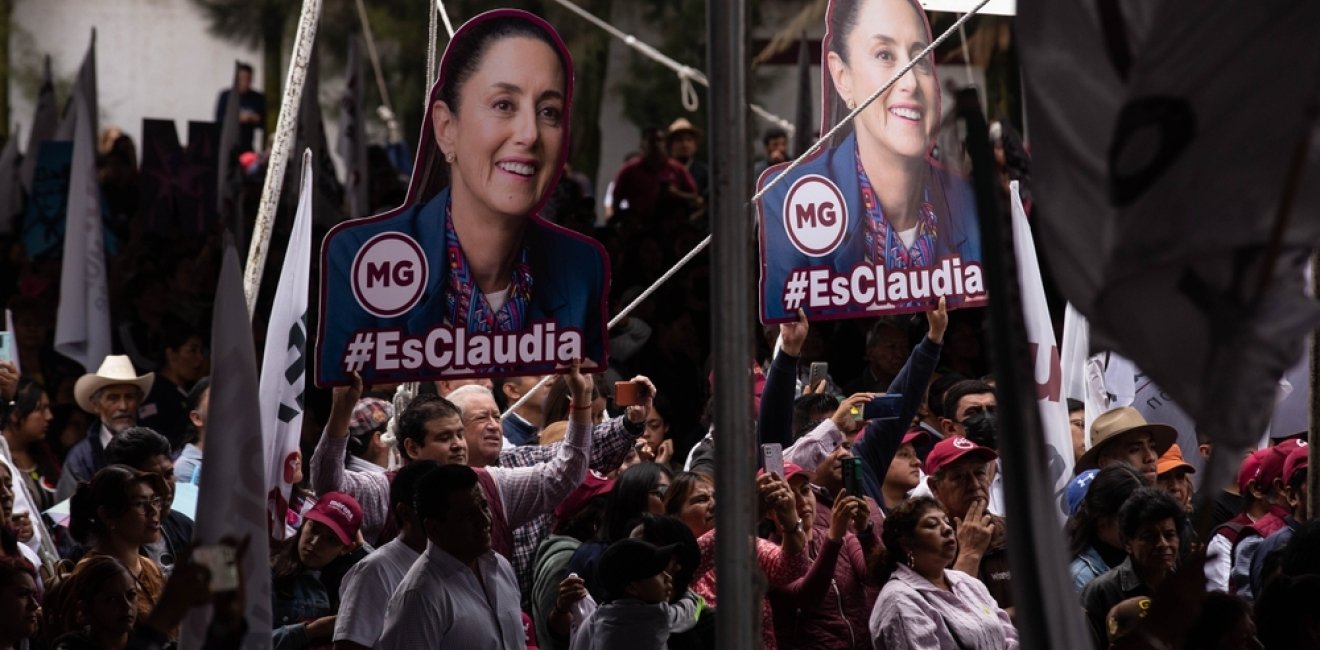On Sunday, 2 June, Mexico elected its first woman president: Claudia Sheinbaum.
Symbolically, this represents a huge leap forward for women in Mexico. While the country has been a regional forerunner in terms of the participation of women in politics, its most powerful role has never been held by a woman. Her victory should not be examined in isolation. It is the result of the extraordinary social, institutional, and cultural changes the country has experienced in questions of gender parity and women’s participation in public positions.
With that said, Sheinbaum is inheriting a country wracked with complex challenges, from crime to economic growth, from a human rights crisis to the intensifying impacts of climate change.
In terms of security, homicides, disappearances, extortions, and femicides represent enormous challenges that need to be tackled through the strengthening of the justice system and the civilian police forces. While Claudia Sheinbaum has pledged to address some of the institutional and social roots of insecurity, she has also expressed her decision to continue with the security strategies of current president López Obrador, including the militarization of public security functions.
With mounting evidence about the detrimental effects of the current government’s security policies, will Mexico’s first female president redirect the state’s responses to violence and crime?
The country that Claudia Sheinbaum is inheriting
Sheinbaum will take on the presidency during one of the most violent periods Mexico has ever experienced. Homicide rates have slightly decreased recently, but the number of people killed yearly in Mexico continues at historical heights. In absolute numbers, Lopez Obrador’s sexenio has been the most violent in the history of the country. From the moment he took office up until December of 2023, there were a total of 166.193 victims of homicides.
Disappearances have also been on the rise in recent years. Sheinbaum, like her predecessor, has a complicated relationship with the collectives of victims looking for their missing and murdered relatives. Controversially, she has argued that disappearances are carried out by criminal groups and not the state, a statement that has been easily disproved by evidence put forward by international human rights watchdogs.
The implications of Mexico’s security crisis goes beyond its human rights factors. Under López Obrador, the military has been deployed around the country at historical levels. Despite such militarization, many parts of the country continue to experience extreme violence at the hands of criminal organizations and a recent study documented an “uneasy coexistence” between military commanders and criminal groups in certain regions of Mexico. Criminal groups are fragmented, and their level of penetration and control is significant and deeply worrisome. Extortion has increased at the local level, and recent reports suggest that everyone from tortilla vendors to small business owners are being targeted.
Violence and insecurity have a gender component. Femicides are the most visible and dramatic expression of the many faces of violence and insecurity that women face on a daily basis. Rather than being the inevitable result of the country’s so-called “machista” culture, the increase in femicides and women’s disappearances are connected to the broader insecurity context and to a scenario where militarization has put women and girls in harm’s way.
Security policies under Sheinbaum
Sheinbaum has recognized insecurity and violence as central challenges for the country’s political and social stability. She has also recognized femicides and gender-based violence as a key component of Mexico’s context of insecurity. And yet, the proposals she has presented so far fail to incorporate a gender and human rights lens that can move the country away from the militarized and punitive approaches that have led to the current crisis.
For instance, the security strategy she presented during her campaign includes five main areas, such as addressing the social causes of insecurity, consolidating the National Guard, strengthening the state’s capacity to investigate and gather intelligence, improve coordination between the state police and the prosecutors offices, and reforming the judicial system.
While some of these areas could indeed result in security policies that advance the institutional reforms and social transformations the country badly needs, others will likely reproduce the same mistakes of the past. Saliently, the consolidation of the National Guard is set to occur hand in hand with the continuing militarization of public security provision, to the detriment of prevention programs, alternative justice mechanisms, or the strengthening of the police at the state and local levels. Militarization has deepened human rights violations, from the use of torture, to disappearances, and arbitrary detentions and, without clear civilian controls, these violations will continue to occur. Sheinbaum’s proposal regarding the creation of social programs to reduce crime, particularly youth crime, is more promising. However, the success of these programs in crime reduction and violence prevention is hard to measure, particularly in the short to medium term.
Part of the problem of Sheinbaum’s security proposals is that they are contradictory at best, and, at worst, they seem to echo or replicate López Obrador’s failed security strategies. For instance, when it comes to femicides, Sheinbaum has stated that all homicides against women should be investigated as femicides and has suggested that each state in Mexico should have a specialized prosecutor's office to tackle the problem of femicides. These are steps in the right direction as evidence has shown legislative harmonization of the crime of femicides is needed and that specialized prosecutor's offices have had a positive effect in the investigation of femicides. Nevertheless, even if both of these measures would be implemented under Sheinbaum’s tenure, the ongoing militarization of the country next to the levels of lethality, impunity, and human rights violations that the military has generated, will undo or undermine any beneficial effects of these policies. Indeed, one of the key blind spots in Sheinbaum’s security proposals is recognizing that, in order to address gender-based violence and violence more broadly, the country needs to demilitarize.
What next?
When it comes to Mexico’s human rights crisis, evidence reveals how militarization begets more violence. Since 2007, and in the last six years in particular, the rate of feminicides and disappearances of women has skyrocketed. Thus, Sheinbaum’s ongoing support for militarizing public security and other functions will likely serve to block any advances she claims she will make in terms of reducing gender-based violence.
With that said, this election represents a watershed moment for Mexico, even if Sheinbaum has a limited understanding or engagement with gender-based issues. Her election reflects the incredible social, cultural, and institutional transformation the country has undergone. It is the result of the struggle of thousands of women who have worked for decades to not only have a voice and representation, but also to be able to make decisions at the highest levels.
Sheinbaum will govern a country where women, victims’ collectives, and feminists form a critical mass that will demand from her more comprehensive and just policies. While she may not bring a gender perspective to her rule, she will find herself forced to engage with those elements of society – in civil society, academia, journalism, and political parties – who will spend the next six years mobilizing for gender justice and holding her accountable to Mexico’s women.
Authors

Mexico Institute Global Fellow; Assistant Professor of Latin American History at George Washington University

Mexico Institute
The Mexico Institute seeks to improve understanding, communication, and cooperation between Mexico and the United States by promoting original research, encouraging public discussion, and proposing policy options for enhancing the bilateral relationship. A binational Advisory Board, chaired by Luis Téllez and Earl Anthony Wayne, oversees the work of the Mexico Institute. Read more

Explore More
Browse Insights & Analysis
Greenland’s New Governing Coalition Signals Consensus

The Future of France's Far-Right Party

Ukrainian Issue in Polish Elections



